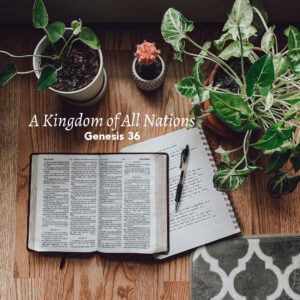Genesis 36: A Kingdom of All Nations
January 16, 2024
TODAY'S BIBLE READING:
Genesis 36, Psalm 16, Matthew 6:25-34, Acts 9:20-43

Not the most inspiring list of names, or natural place to go, for a piece of devotional literature! It gives us an opportunity, though, to remind ourselves of some hermeneutical (=right approach to interpreting the Bible) tools. When we come across a passage in Scripture, we ask ourselves what the author’s intent is—that is, we ask, “Why is this here?” or particularly, “What was the purpose of the author in writing this part of the story?”
Behind this question is the assumption that the author of the book or passage had a purpose, that he knew what he was doing, and that he is trying to communicate something to us that is worth listening to. However, we should also ask not just the question about the human author, but also a question related to the divine author. That is, we should ask not just why this author put this chapter here in this book, but why this is here in the Bible as a whole. What role does this story tell in the grand story of the whole Bible?
When we ask these kind of questions of this text, and notice the common technique in narrative of “repetition” to make an emphasis, we can begin to see the sort of reason that this apparently rather mundane, even boring, list of so-and-so begat so-and-so is in the Bible. The key word that is repeated is the word “king” (or “chief”). This is remarkable because just previous to this chapter, Jacob—the one who has received the covenant blessing and from whom the Messiah, the serpent crusher, will come—has been told that he shall have kings and (presumably therefore) a kingdom coming from him (Gen. 35:11).
However, this kingdom and this king do not even at a human level appear among the people of Israel until Saul; then David, the king after God’s own heart; and then the Messiah King Jesus, the great David’s greater Son. But right now among Esau (Edom), of all people, we find quickly a list of kings, kings who are not dynastic (not inheriting by birth), but probably some sort of elective kings, right in Edom.
The story of the Edomites is somewhat checkered in biblical history. They would not allow God’s people coming out of Egypt to go through their territory; the Israelites were prevented from fighting “their brothers”; and they are not conquered until the time of David, after which they are criticized by the prophets for their role in opposition to Israel much later in the story. Paul, of course, emphasizes the sovereignty of God in choosing Jacob, not Esau, in Romans 9, as we have already seen in previous days when we first came across these two brothers.
So why is it that Esau, Edom, is the first to begin to practice kingship? What is the author of the story telling us? It is a message, right from here, echoing the international promise given to Abraham that his blessing would be a blessing for all nations, that the kingdom of God is one that is accessible by all nations and peoples. There is a line, a seed, a covenant blessing to God’s people, but even in the Old Testament that blessing was meant to extend to all nations. And now in the New Testament we hear Jesus’ commission to make disciples of all nations, teaching them to obey everything he has commanded in this kingdom of God and the Lord Jesus Christ (Matt. 28:19-20).
ABOUT THE AUTHOR
Josh Moody (Ph.D., University of Cambridge) is the senior pastor of College Church in Wheaton, IL., president and founder of God Centered Life Ministries, and author of several books including How the Bible Can Change Your Life and John 1-12 For You.
WANT MORE?
To receive God Centered Life devotionals directly in your inbox, as well as other resources, enter your email address in the form at the bottom of this page and click "subscribe."

